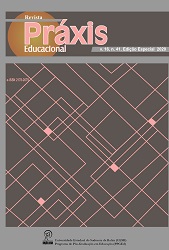MAPPING OF STUDIES ON INTELLECTUAL DISABILITY, LITERACY AND TECHNOLOGY: STATE OF THE QUESTION
DOI:
https://doi.org/10.22481/praxisedu.v16i41.6480Keywords:
Intellectual disability, Literacy, TechnologyAbstract
This article presents the elaboration of the State of the question (EQ) on the theme of using reading and writing applications in the literacy and literacy of children with intellectual disabilities, in the area of Education. For this, we proceeded to the survey of national and international studies was carried out in magazines, indexed by the Coordination for the Improvement of Higher Education Personnel (CAPES) and in the annals of the National Association of Graduate Studies and Research in Education (ANPEd).The immersion in assigned literature provided an opportunity to refer to a relevant and extensive number of published productions articulated on the subject under investigation. Of the total of 1644 (100%) studies consulted, 78 (4.7%) showed evidence of proximity to our research object, addressing the themes of intellectual disability, literacy and literacy, technology and/or applications and revealing the interest of researchers in these approaches. We also noticed that, in general, there were few works that linked technologies to deficiencies and or disorders, even rarer those that operated with mobile devices and apps. In this way, the search to unveil the theme in question has emerged a fruitful field for the most diverse papers/articles, to embark transversal and interdisciplinary areas, in order to avoid bias in the conceptualization of theoretical-empirical categories and definition of references. Therefore, this exercise became essential to know ‘what was’ and ‘what is being’ produced by academics in this specific area of research.
Downloads
Downloads
Published
Issue
Section
License
Copyright (c) 2020 Práxis Educacional

This work is licensed under a Creative Commons Attribution-ShareAlike 4.0 International License.
Você é livre para:
Compartilhar - copia e redistribui o material em qualquer meio ou formato; Adapte - remixe, transforme e construa a partir do material para qualquer propósito, mesmo comercialmente. Esta licença é aceitável para Obras Culturais Livres. O licenciante não pode revogar essas liberdades, desde que você siga os termos da licença.
Sob os seguintes termos:
Atribuição - você deve dar o crédito apropriado, fornecer um link para a licença e indicar se alguma alteração foi feita. Você pode fazer isso de qualquer maneira razoável, mas não de uma forma que sugira que você ou seu uso seja aprovado pelo licenciante.
Não há restrições adicionais - Você não pode aplicar termos legais ou medidas tecnológicas que restrinjam legalmente outros para fazer qualquer uso permitido pela licença.












